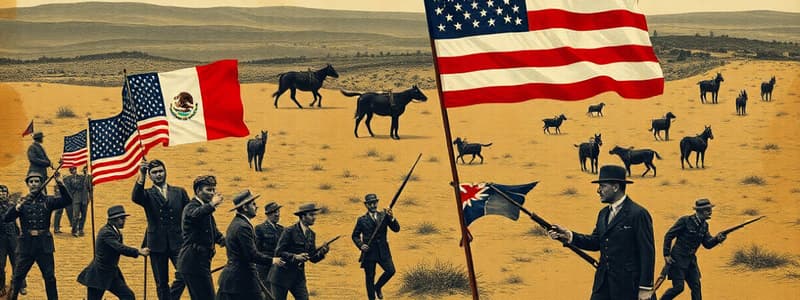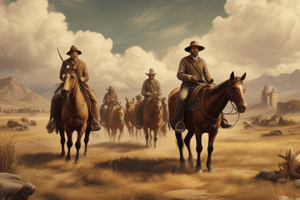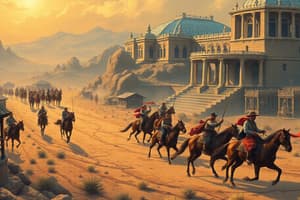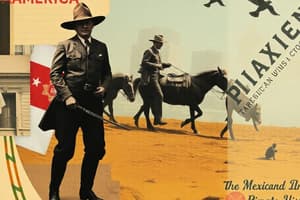Podcast
Questions and Answers
What economic factors contributed to the westward expansion?
What economic factors contributed to the westward expansion?
- Increased immigration from Europe
- Desire for new educational opportunities
- Development of new political ideologies
- Search for land and resources (correct)
How did Romanticism in art contribute to the migration to the west?
How did Romanticism in art contribute to the migration to the west?
- It promoted urban development and infrastructure
- It inspired the ideal of westward expansion as a quest for freedom (correct)
- It emphasized the expansion of industrialism
- It discouraged individualism and promoted collectivism
What was the Democratic Party's stance on expansion during the mid-19th century?
What was the Democratic Party's stance on expansion during the mid-19th century?
- They were opposed and advocated for isolationism
- They were indifferent and took no formal position
- They supported expansion aggressively (correct)
- They focused solely on domestic issues
What were the main causes of the Mexican-American War?
What were the main causes of the Mexican-American War?
What was the significance of Abraham Lincoln's 'spot resolutions'?
What was the significance of Abraham Lincoln's 'spot resolutions'?
Why was the Wilmot Proviso important in the slavery debate?
Why was the Wilmot Proviso important in the slavery debate?
What was 'Bleeding Kansas'?
What was 'Bleeding Kansas'?
What did John Brown aim to achieve by attacking the federal army base at Harper's Ferry?
What did John Brown aim to achieve by attacking the federal army base at Harper's Ferry?
What was the Supreme Court's ruling in the Dred Scott case?
What was the Supreme Court's ruling in the Dred Scott case?
How did abolitionists differ from anti-slavery/free soil supporters?
How did abolitionists differ from anti-slavery/free soil supporters?
What was a key result of the collapse of the Whig Party during the 1850s?
What was a key result of the collapse of the Whig Party during the 1850s?
Which candidate in the 1860 presidential election supported popular sovereignty?
Which candidate in the 1860 presidential election supported popular sovereignty?
What was the intention behind Lincoln’s Emancipation Proclamation?
What was the intention behind Lincoln’s Emancipation Proclamation?
What was 'hard war' as adopted by Union commanders?
What was 'hard war' as adopted by Union commanders?
What was the primary goal of the Freedmen's Bureau?
What was the primary goal of the Freedmen's Bureau?
How were the approaches of Lincoln and the Radical Republicans towards Reconstruction different?
How were the approaches of Lincoln and the Radical Republicans towards Reconstruction different?
What was the purpose of the Tenure of Office Act?
What was the purpose of the Tenure of Office Act?
What led to increased sectional tensions during the Caning of Charles Sumner?
What led to increased sectional tensions during the Caning of Charles Sumner?
What did the 1876 election reveal about American politics of the time?
What did the 1876 election reveal about American politics of the time?
What stance did Andrew Johnson take regarding the Confederacy?
What stance did Andrew Johnson take regarding the Confederacy?
What were Black Codes and what was their main purpose?
What were Black Codes and what was their main purpose?
Flashcards
Manifest Destiny
Manifest Destiny
Belief that the US was destined to expand its territory.
Wilmot Proviso
Wilmot Proviso
Proposal to ban slavery in territories from Mexican War.
Compromise of 1850
Compromise of 1850
Agreement to address slavery in newly acquired lands.
Fugitive Slave Act
Fugitive Slave Act
Signup and view all the flashcards
Popular Sovereignty
Popular Sovereignty
Signup and view all the flashcards
Bleeding Kansas
Bleeding Kansas
Signup and view all the flashcards
John Brown
John Brown
Signup and view all the flashcards
Mexican-American War Causes
Mexican-American War Causes
Signup and view all the flashcards
Dred Scott Decision
Dred Scott Decision
Signup and view all the flashcards
Abolitionists vs. Anti-Slavery
Abolitionists vs. Anti-Slavery
Signup and view all the flashcards
1850s-60s Party Changes
1850s-60s Party Changes
Signup and view all the flashcards
1860 Presidential Candidates
1860 Presidential Candidates
Signup and view all the flashcards
"Draw a line, work out a solution" Approach
"Draw a line, work out a solution" Approach
Signup and view all the flashcards
Caning of Charles Sumner
Caning of Charles Sumner
Signup and view all the flashcards
Lincoln's Election & Secession
Lincoln's Election & Secession
Signup and view all the flashcards
Southern Secession Justification
Southern Secession Justification
Signup and view all the flashcards
Union/Confederate Soldier Motives
Union/Confederate Soldier Motives
Signup and view all the flashcards
Black Men Joining Union War Effort
Black Men Joining Union War Effort
Signup and view all the flashcards
Emancipation Proclamation Impact
Emancipation Proclamation Impact
Signup and view all the flashcards
Lincoln's View on Confederacy
Lincoln's View on Confederacy
Signup and view all the flashcards
Hard War Tactics
Hard War Tactics
Signup and view all the flashcards
Reconstruction Plans(Lincoln)
Reconstruction Plans(Lincoln)
Signup and view all the flashcards
Study Notes
Westward Expansion and the Mexican-American War
- Economic factors fueled westward migration, including desire for land, resources, and economic opportunities.
- Romanticism's emphasis on nature and individualism inspired the westward movement.
- The Democratic Party supported westward expansion, while the Whigs were more cautious.
- James K. Polk's election pushed for Texas annexation and expansion into Oregon and California in 1844.
- Causes of the Mexican-American War included border disputes, U.S. expansionism, and Mexico's refusal to negotiate.
- Abraham Lincoln's "spot resolutions" challenged the war's justification, expressing widespread anti-war sentiment.
- Henry David Thoreau's tax refusal, documented in "Civil Disobedience", was a protest of the Mexican War.
Antebellum Slavery and Sectionalism
- The Wilmot Proviso proposed banning slavery in Mexican territory, intensifying sectional conflict.
- The Compromise of 1850 included California's admission as a free state, a stricter Fugitive Slave Act, and popular sovereignty.
- The Fugitive Slave Act of 1850 forced Northerners to return runaway slaves, worsening anti-slavery sentiment.
- Southerners opposed California's free state status to maintain Southern influence in the Senate.
- The Kansas-Nebraska Act allowed settlers to decide on slavery through popular sovereignty, leading to violence in Kansas.
- "Bleeding Kansas" involved violent conflicts over slavery, with John Brown as an active participant.
- John Brown's Harper's Ferry raid aimed to initiate a slave rebellion.
- The Dred Scott decision ruled that African Americans were not U.S. citizens; the Court's decision aimed at settling slavery's legality in the U.S.
- Abolitionists sought to end slavery entirely, while anti-slavery/free soilers opposed expansion but didn't necessarily support abolition.
- Political parties changed, with the Whigs dissolving and the Republican Party formed to oppose slavery.
1860 Presidential Election and Secession
- Lincoln's election in 1860 fueled Southern secession due to fears about slavery's future.
- Southern leaders argued for states' rights and the right to secede, citing the preservation of slavery.
- Union and Confederate soldiers fought for duty, honor, and their homes (primarily the Union to protect the country; Confederates to protect states' rights and slavery).
- Black men joined the Union military for freedom and equality.
The Civil War
- Lincoln insisted that the Confederacy was a rebel part of the U.S., declining to recognize it.
- The Emancipation Proclamation freed enslaved people in Confederate states, excluding border states for political reasons.
- "Hard war" tactics, practiced by Union commanders like Grant and Sherman, aimed at total victory by destroying resources, but led to civilian suffering.
- The Union held advantages in resources and manpower, while the Confederacy benefited from better leadership and local military knowledge.
Reconstruction
- Lincoln aimed for a lenient approach to reintegrating the South, contrasting with Radical Republicans' harsher stance.
- Andrew Johnson's Reconstruction plan was similar to Lincoln's but allowed for greater Southern autonomy, based on his Southern background and previous stance on slavery.
- The Freedmen's Bureau assisted freedmen with education, healthcare, and legal support.
- "Black Codes" limited the rights of African Americans, primarily to maintain a cheap labor force.
- The Tenure of Office Act restricted presidential power, leading to Johnson's impeachment.
- Disputed results led to a contested 1876 election determined by a commission.
Studying That Suits You
Use AI to generate personalized quizzes and flashcards to suit your learning preferences.




